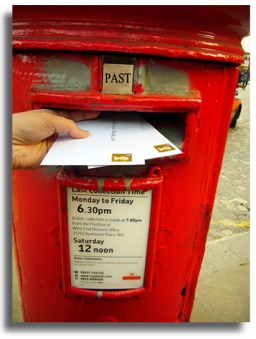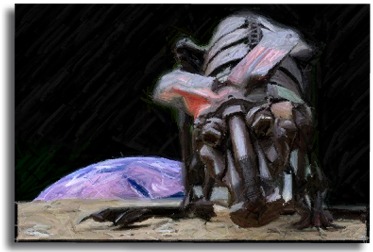Posted by Nicky Drayden on Jul 4, 2010 in
Reviews Published by: Analog Science Fiction and Fact, September 2010
 Photo by Sarah G. Creative Commons
Photo by Sarah G. Creative Commons
The Story:
A high school counselor and sometimes basketball coach is tasked each year with consoling the students who don’t receive letters from their future selves on Red Letter Day. She knows first hand the devastating effect of not getting a peek into her future, of not getting the tidbit of advice that will encourage a certain career path, or at the least, warn of a grave mistake to be avoided. She’s spent the last 32 years wondering why her future self hadn’t told her to go straight to pro basketball out of high school, or warned her that she’d blow out her knee in her first college game. She’s the kind of person who’d leave a note for her former self, which leaves her to wonder if she won’t survive to write the note at all.
Her fiftieth birthday is now two weeks away, on which she’ll be able to write her letter to her former self. Time travel laws dictate that there can only be one message that goes back into time, with only one specific event mentioned in the letter. These strict laws insure that major past events aren’t purposefully tampered with, though millions of alternate universes are still created from the contacts, and worse, our futures become something limited by a few words scribbled onto paper.
The Craft:
SPOILERS
Red Letter Day is a great example of putting a human face on the implications of time travel. Politics would play heavily into such an invention, and could easily run amok if not strictly controlled. I really enjoyed the solution of the red letters, which allows everyone to have their hand at time travel, though not directly. This piece was also didn’t leave me with my usual time-travel headache by writing off all of the anomalies as alternate universes spurred off of the original. Seeing how the narrator’s life had been changed by not receiving a letter was touching, and it’s interesting that she fell into a life of counseling others who found themselves in the same situation. She gives a lot of thought to the situation, and even though she’s not angsty about it, we can see how deeply this has affected her, throwing her into a life-long puzzle with no solution.
Though this piece is short, it resonates well beyond the events in the story. A broader technological world exists, hinted at through mentions of interactive technology and nanosurgery. I liked how nonchalantly the science is woven into the fiction, not calling attention to itself, but there. And of course, the story poses the moral implications of time travel, even something so seemingly innocuous as a vaguely worded letter from the future — how it can destroy lives just as easily as it can save them. This story is definitely a fun one to think about, especially with the twist ending. What piece of advice would you send to your eighteen-year-old self, if any? Would it differ if you hadn’t received a note the first time around? 
Tags: Analog, science fiction, time travel
Posted by Nicky Drayden on Jun 13, 2010 in
Reviews Author website: http://scottwilliamcarter.com/
Published by: Analog Magazine, July/August 2010
 Photo by JasonR611 Creative Commons
Photo by JasonR611 Creative Commons
The Story:
Dexter Duff is a private investigator whose already hazardous lifestyle gets a little more dangerous when his three-breasted ex-girlfriend walks back into his life. She’d burned him bad the first time around, cleaning out his bank accounts and taking off with his ship. Now she needs him to help solve the mystery of what happened to her new husband, Vergon Daughn. Yes, that Vergon — the richest manufacturer of stepdocks in the galaxy.
What surprises Duff the most isn’t that his ex-girlfriend is now a multi-millionaire, but that she’d married an android, barely a second class citizen with limited rights. Not that it doesn’t make sense. Ginger had always been emotionally stunted. But then Vergon had gone off and gotten his memories inserted into real flesh and blood as a wedding present to Ginger, and to make matters more complicated, he had the procedure reversed when living as a humanoid wasn’t working out. He hasn’t been seen since. Now Duff’s in a tough position. Does he take the job and risk allowing Ginger back into his life, or is that all he wants in the first place?
The Craft:
SPOILERS
(Story opening available here)
I have to say, I really enjoyed the spin on the classic android becomes a human motif, and this story is a great example of putting a fresh view on old ideas. The story was a little off-putting at first for me as a female reader, though, the opening line being “The last time I saw Ginger, she was sporting two breasts instead of three.” Not that I don’t enjoy a little booby humor, but putting them out there right on the first line made me cringe, and I questioned if I wanted to continue with the story. A few paragraphs in, Duff’s voice fit the standard snarky private dick persona, and brought nothing new to the table, but I pushed through the questionable opening and was glad I did.
Once the story got going, I got wrapped up in the mystery surrounding Vergon’s disappearance and really enjoyed the world building that accompanied it. Duff’s conversation with Bwer Fwer, the biomechanical engineer that performed the human-to-android and android-to-human transferences on Vergon was quite comical. Bwer Fwer had the misfortune of being a single instance of a hive-mind society who are geniuses when they work together, but idiots when separated. Bwer Fwer compensates for this by using a device that simulates an Artificial Intelligence based hive-mind, allowing him to function at a higher level. There are side-effects to the technology, however, causing him to blurt out random lines during his conversation with Duff, making for both comical dialogue and interesting world building. Overall, the witty dialogue was one of the greatest strengths of the story, though it did tend to drag on too long in a few places.
The plot was well stitched together, admirably so. I enjoyed the twists and turns of Duff’s journey, and its profound alieness transported me to this other world. Character development was on the sparse side, but there was enough of it to propel the story forward. All-in-all, The Android Who Became a Human Who Became an Android is another plot-driven, pulpish romp through space. Mark that as the second in this issue. We’ll see what the other stories have to offer.
Tags: Analog, android, pulp fiction, science fiction, space opera
Posted by Nicky Drayden on Jun 4, 2010 in
Reviews Published by: Analog Magazine, July/August 2010
 Metal Roo Image by Richard.Fisher Creative Commons
Metal Roo Image by Richard.Fisher Creative Commons
The Story:
Blame it on politics for the inhabitants of First Lunar Outpost being the recipients of a brand new Lunaroo, Australia’s contribution to the space program. It’s a robot kangaroo with a cockpit designed to hop its passengers around the lunar surface. Aussie engineer Adrian was shipped up with the Roo, and he knows it’s going to be tough selling the lunar residents on this revolutionary method of transport, but what better way to get around in 18% gravity than hopping over rough surfaces? After the Lunaroo’s maiden voyage, however, Adrian might have a hard time selling the idea to himself.
The Craft:
SPOILERS
At the heart of The Long Way Around is the interesting concept of an alternate form of lunar transport that steps away from the old moon buggy fallback. The inhabitants of the First Lunar Outpost are skeptical about how much use it will be under the hostile conditions of the moon. But beggars can’t be choosers, so moon resident Victor volunteers to go with Adrian to take the Lunaroo for a test run out to the solar furnace, five kilometers away from the base. Their plans get changed along the way, and they instead decide to venture to the Silent Earth Radio Telescope even further out.
Navigating the Lunaroo takes some getting used to, with the vehicle being sensitive to the movements of its passengers. A little body English can make turns go easier, but Victor makes a mistake, throwing his weight around and sending the Lunaroo crashing down on its side. The Lunaroo’s forward motion is busted, along with its communications, and Adrian’s knee is as well. Over twenty kilometers away from help, oxygen, and protection from the rising sun, Adrian and Victor must use their wits to find a way to save themselves from death.
The story is full of action and danger, with a hefty dose of science for those who like to geek out on telescopes, radio signals and such. Plus a dab of humor in the form of the real world bureaucracy that would send such an inept design to the moon in the first place. But I found myself wanting more from this story than just a cool concept and action. I wanted to know more about the characters and what brought them to the moon, and see more of the outpost itself. I also had a hard time getting a sense of things spatially, since the description veered towards the sparse side. It was a cute story for what it was, a quick, plot-driven romp around the moon.
Tags: Analog, kangaroo, moon, science fiction
 Photo by Sarah G. Creative Commons
Photo by Sarah G. Creative Commons


